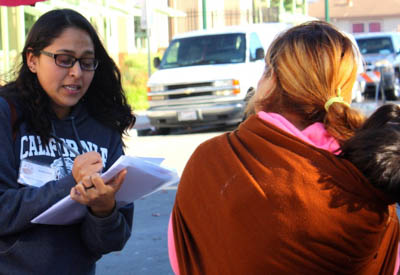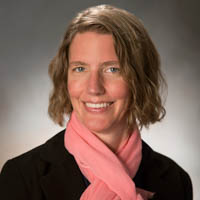Campus News
UC Santa Cruz and United Way partner to empower youth through research in local communities
A research partnership between UC Santa Cruz and United Way of Santa Cruz County will offer local youth and UCSC undergraduates new leadership platforms and support college-readiness and success.




A new three-year, $650,000 grant will link UC Santa Cruz with the United Way of Santa Cruz County’s Youth Action Network to support youth empowerment and leadership throughout the county. Faculty and undergraduate students will partner with local high school and middle school students in Watsonville and Live Oak to design and implement community-engaged research projects.
This work will provide new insight on youth education, health, and wellbeing initiatives and community services for immigrant and mixed-status families, unhoused families, and migrant working families. Local youth and UC Santa Cruz undergraduates who gain research experience through the program will have a new leadership platform to influence local policy. Also, the program is designed to support college-readiness and success, particularly for Latinx students who are or will be the first in their families to attend college.
The funding for this project comes from the highly-competitive, nationwide Institutional Challenge Grant, supported by the William T. Grant Foundation, Spencer Foundation, and Doris Duke Charitable Foundation. These grants help universities and community organizations work together to reduce inequalities in youth outcomes. UC Santa Cruz, Johns Hopkins University, and Northeastern University were this year’s winners, while Cornell University received a continuation of funding.
“Make no mistake, there were much larger institutions and larger agencies as finalists for this award,” said Keisha Browder, chief executive officer of United Way of Santa Cruz County. “For UC Santa Cruz and United Way to win this award affirms our ability to deepen and scale our work to improve youth outcomes.”
Youth leadership through research
Browder will work alongside Associate Professor of Sociology Rebecca London and Professor of Psychology Regina Langhout to co-manage the new grant project, which kicks off in September. The first step will be a nine-month planning period including a workshop with undergraduates and youth leaders to develop a youth-driven research agenda.
“It’s essential for young people to be the ones to ask important questions that create new knowledge,” Langhout said. “The research questions will be different when they come from the youth in the community. We really need to include youth voices, or we won’t be getting the full picture.”
After the initial planning period, four cohorts of about 30 middle and high school students from United Way’s Youth Action Network will partner with similar cohorts of UC Santa Cruz undergraduate students to conduct research in the community. They’ll be guided by Langhout and three other faculty fellows: Professor of Latin American and Latino Studies Jessica Taft, Associate Professor of Sociology Steve McKay, and Assistant Professor of Psychology Saskias Casanova.
“These fellows are phenomenal ambassadors for our work in the community,” said Rebecca London, the grant’s principal investigator. “They each have a lot they can share about ethical and actionable community-engaged research. I’m looking forward to working alongside them in the formation of this partnership, and I think the young people in our community will be really excited about it too.”
The project is also designed to position undergraduates as mentors for local youth. First-generation Latinx college students face inequalities in access to research opportunities, but new community-engaged research projects can help to close that gap while fostering meaningful connections with youth from similar backgrounds. The combined benefits of these relationships and research experiences could improve educational outcomes.
“This is an opportunity to truly connect our youth to college students and the college experience,” Keisha Browder explained. “The sense of belonging builds their confidence for college and research. You see high school students walk with pride that they are doing this type of work. It gives us a chance to ignite that passion in a student and get them imagining who they could be once they step onto a college campus.”
Building capacity for the future
Sarah Emmert, Director of Community Impact at United Way of Santa Cruz County, will advise on the program’s research projects as a community fellow. Through this process, Emmert, a 2011 UCSC graduate, will learn new research methods and strategies for applying and disseminating findings throughout the community. The goal is to strengthen United Way’s role as a local leader in using research to inform practice for public service programs.
The grant will also give UC Santa Cruz an opportunity to build new internal structures and policies that will help advance the university’s impact in the community. With the support of the Office of Research, the project will develop ethics guidelines for community-based research and incorporate input from partners like United Way. The grant project will also recommend university-wide standards for how the value of community-engaged work is weighed in processes like tenure decisions and departmental reviews.
Additionally, UC Santa Cruz will create a new Campus + Community center to offer resources, support, and relationship-building that will connect university scholarship and research with the needs of community partners. The Campus + Community center will initially be housed within the Institute for Social Transformation, and Rebecca London will be the center’s inaugural faculty director.
“We’re hoping to be a landing spot for the community so that it’s easier for local organizations to access the expertise of researchers on campus,” she said. “There are many folks on campus who really want to do work out in the community. We can help match them and make sure that those partnerships work well.”
A recent inventory of community engagement among staff and faculty at UC Santa Cruz over the past five years documented 176 teaching and research projects and 153 service projects, which involved thousands of undergraduates. The new grant project and partnership with United Way will ensure that efforts like these continue to grow and improve in the future.